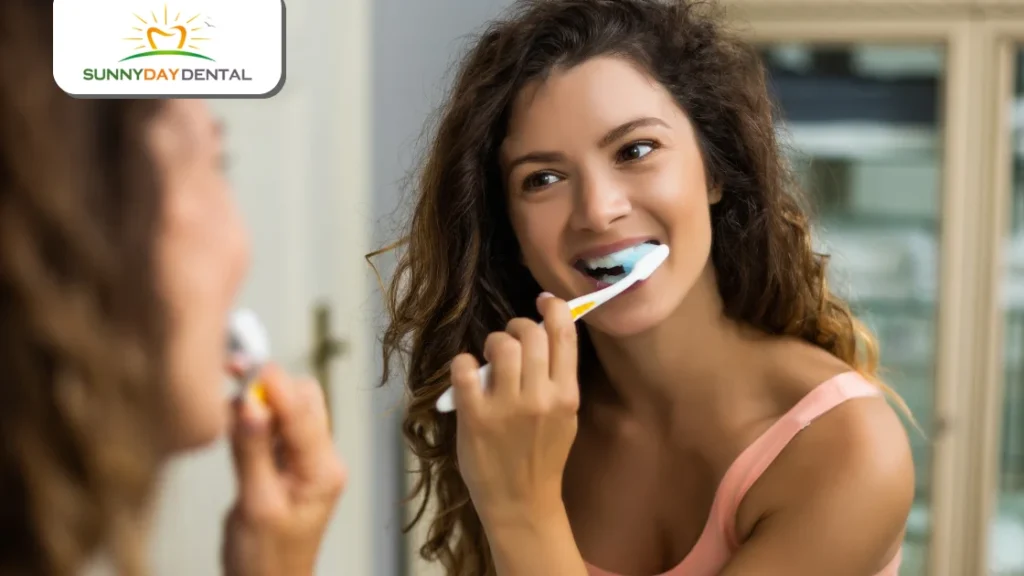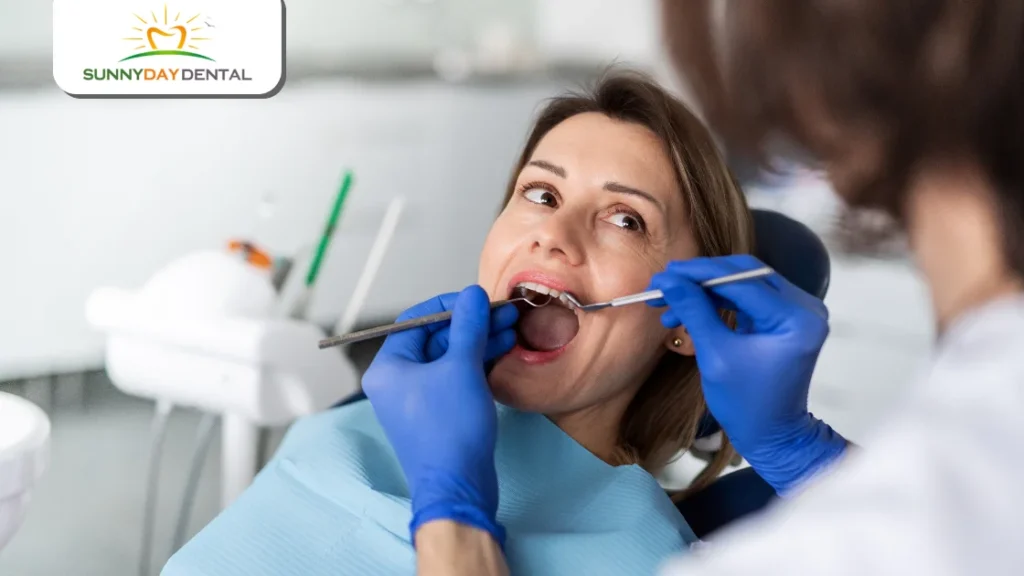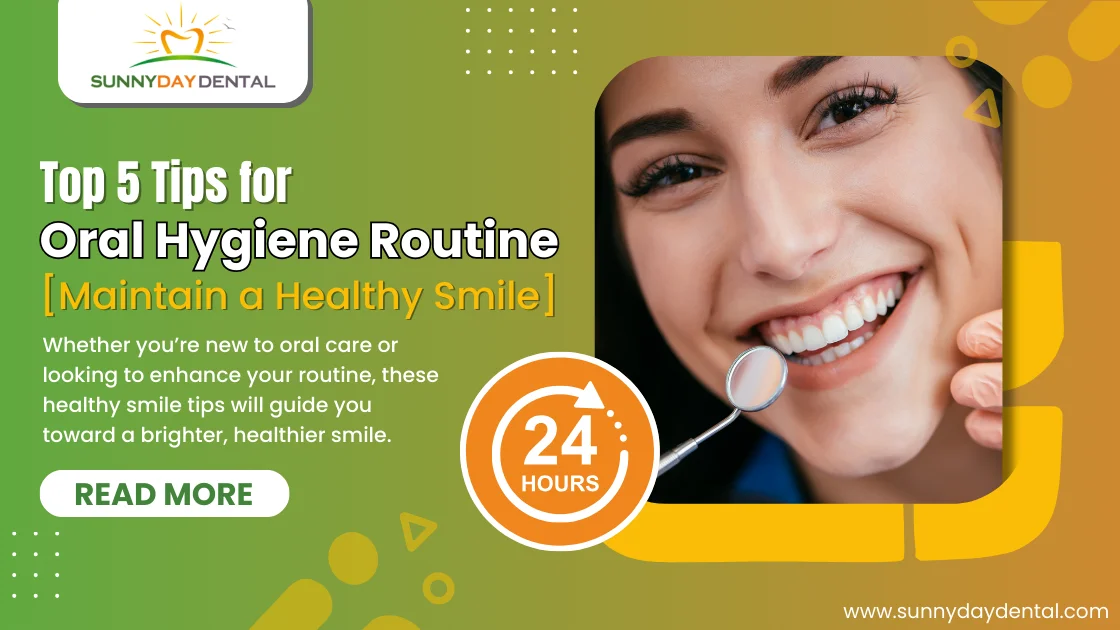A radiant smile not only boosts your confidence but also reflects your overall health. Keeping your smile healthy requires consistent care and attention to your oral hygiene routine. In this comprehensive guide, we share expert tips to help you maintain a healthy smile, drawing on the latest research in 2024.
Table of Contents
ToggleWhether you’re new to oral care or looking to enhance your routine, these healthy smile tips will guide you toward a brighter, healthier smile.
Get started now!
1. Brush Twice Daily with the Right Technique

Your oral hygiene routine starts with brushing, and while doing it regularly is important, the technique you use is equally crucial. Choose a soft-bristled toothbrush paired with fluoride toothpaste. Brush for a minimum of two minutes, making sure to clean every surface of your teeth. Position the toothbrush at a 45-degree angle against your gums and use gentle, circular strokes. Be careful not to brush too hard, as this can harm your enamel and cause gum irritation.
Latest Research: A study published in the Journal of Dental Research in 2024 emphasized the importance of brushing technique over the type of toothbrush used. Proper technique was found to significantly reduce plaque and gingivitis compared to incorrect brushing habits.
2. Don’t Forget to Floss Daily
Flossing is a crucial element of any oral hygiene routine, yet it’s often overlooked. Flossing effectively removes food debris and plaque from between your teeth and beneath the gumline—areas your toothbrush can’t reach. Daily flossing helps prevent plaque buildup, reducing the risk of cavities and gum disease.
Helpful Tip: Take about 18 inches of floss and wrap most of it around your middle fingers, leaving an inch or two to work with. Carefully slide the floss between your teeth, curving it into a C shape around each tooth. Be gentle and avoid snapping the floss to protect your gums from injury.
3. Incorporate Mouthwash for Extra Protection

Adding an antimicrobial or fluoride mouthwash to your oral hygiene routine can provide extra protection against cavities, gum disease, and bad breath. Mouthwash reaches areas that brushing and flossing might miss, reducing bacteria in your mouth. However, it shouldn’t replace brushing or flossing; rather, it should complement these practices.
Latest insight: In 2024, dental experts highlight that mouthwash containing chlorhexidine or cetylpyridinium chloride can effectively reduce gingivitis and plaque when used consistently in conjunction with regular brushing and flossing.
4. Watch Your Diet for a Healthier Smile
Your diet significantly impacts the health of your smile. Consuming sugary and acidic foods can weaken enamel and increase the risk of cavities. To keep your teeth strong, include calcium-rich foods such as dairy products, leafy greens, and almonds in your diet. Crunchy fruits and vegetables, like apples and carrots, also serve as natural cleansers, helping to remove food particles and promote gum health.
Pro tip: Limit snacking between meals as it increases the risk of tooth decay. Drink plenty of water throughout the day to wash away food particles and neutralize acids.
5. Schedule Regular Dental Check-ups

Even with the best oral hygiene routine, regular visits to your dentist are essential. Your dentist can detect early signs of cavities, gum disease, and other oral health issues that you might miss. Professional teeth cleanings remove tartar that can’t be eliminated by brushing and flossing alone, ensuring your teeth and gums stay healthy.
Latest recommendation: The American Dental Association (ADA) in 2024 recommends visiting your dentist every six months for a comprehensive check-up and cleaning. However, those at higher risk of dental issues might need more frequent visits.
If you want to maintain a healthy smile, it takes more than just brushing—it’s about a comprehensive oral hygiene routine, a balanced diet, and regular dental care. Follow these expert healthy smile tips to ensure your smile stays bright for years to come!
How Often Should You Visit the Dentist?
For the best oral health, schedule a dental check-up and professional cleaning every six months. Maintaining regular visits and follow up routines will help your dentist to catch and address any dental problems early, keeping your smile healthy and preventing more serious issues from developing.
Protect Your Smile with Expert Care at Sunny Day Dental
Maintaining a healthy smile requires dedication and expert care. At Sunny Day Dental, we’re committed to helping you achieve your best smile.
We are a qualified and certified team of the best dentists in Woodbridge provides personalized care to meet all your oral health needs. Book your appointment today at www.sunnydaydental.com and let us help you maintain a healthy, radiant smile.
FAQs for Oral Hygiene Routine
1. How does brushing technique affect my oral health?
Your brushing technique significantly impacts your oral health. Using the correct technique—brushing at a 45-degree angle, using gentle circular motions, and brushing for two minutes—helps remove plaque and prevent gum damage. A proper technique is more important than the type of toothbrush you use.
2. Can I skip flossing if I brush regularly?
No, flossing is crucial even if you brush regularly. Flossing removes plaque and food particles from between your teeth and under your gumline, where your toothbrush can’t reach. Without flossing, you increase the risk of cavities and gum disease in these areas.
3. Is mouthwash necessary for a healthy smile?
Mouthwash isn’t necessary but is beneficial for a healthy smile. It provides extra protection by reducing bacteria, freshening breath, and reaching areas your toothbrush and floss might miss. However, it should complement, not replace, brushing and flossing.
4. What foods should I avoid to protect my teeth?
Avoid sugary and acidic foods as they can erode enamel and cause cavities. Limit snacking between meals, and opt for teeth-friendly foods like dairy, leafy greens, and crunchy fruits and vegetables that help clean your teeth naturally.
5. How often should I visit the dentist?
You should visit your dentist every six months for a routine check-up and professional cleaning. Regular visits help detect early signs of dental issues and keep your teeth and gums healthy. Some individuals might need more frequent visits based on their oral health.


